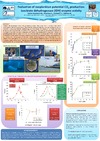Please use this identifier to cite or link to this item:
https://accedacris.ulpgc.es/jspui/handle/10553/16930
| DC Field | Value | Language |
|---|---|---|
| dc.contributor.author | Tames-Espinosa, Mayte | en_US |
| dc.contributor.author | Martínez, Ico | en_US |
| dc.contributor.author | Packard, Theodore T. | en_US |
| dc.contributor.author | Gómez, May | en_US |
| dc.date.accessioned | 2016-05-10T10:53:01Z | |
| dc.date.accessioned | 2018-06-15T09:24:18Z | - |
| dc.date.available | 2016-05-10T10:53:01Z | |
| dc.date.available | 2018-06-15T09:24:18Z | - |
| dc.date.issued | 2016 | en_US |
| dc.identifier.uri | https://accedacris.ulpgc.es/handle/10553/16930 | - |
| dc.description.abstract | Isocitrate dehydrogenase (IDH), a CO2 producing enzyme, plays a key role in the Krebs cycle, being responsible for the emission of one of the three CO2 molecules related to this central phase of cellular respiration. Using a modified IDH methodology, we have assayed IDH activity in the marine planktonic community and have calculated its potential CO2 production. This measure will improve estimations of the impact of plankton on ocean carbon flux and carbon sequestration in the deep ocean. Samples of different plankton fractions (from 0.7 to 50 µm, from 50 to 200 µm and from 200 to 2000 µm) from the Canary Island coastal waters were used to develop and validate this method. Although more experiments are needed, this methodology is leading to a better understanding of cellular respiration in marine samples. Thus, other points of view about the role of plankton communities within the food chain, new knowledge about vertical carbon flux and new estimations about the current sequestering capacity for anthropogenic CO2 by these plankton communities are emerging. | en_US |
| dc.language | eng | en_US |
| dc.subject | 251001 Oceanografía biológica | en_US |
| dc.title | Evaluation of zooplankton potential CO2 production: isocitrate dehydrogenase (IDH) enzyme activity | en_US |
| dc.type | info:eu-repo/semantics/conferenceobject | en_US |
| dc.type | Conference poster | en_US |
| dc.investigacion | Ciencias | en_US |
| dc.project.acronym | BIOMBA | es |
| dc.project.classification | Investigación | es |
| dc.project.end | 2015-12-31 | |
| dc.project.reference | CTM2012-32729 | es |
| dc.project.scope | Estatal | es |
| dc.project.sponsorship | Ministerio de Economía y Competitividad | es |
| dc.project.start | 2013-01-01 | |
| dc.project.title | Metabolismo planctónico: regulación bioquímica e impacto oceanográfico | es |
| dc.project.type | Proyecto | es |
| dc.rights.accessrights | info:eu-repo/semantics/openAccess | es |
| dc.type2 | Póster de congresos | en_US |
| dc.identifier.ulpgc | Sí | es |
| item.grantfulltext | open | - |
| item.fulltext | Con texto completo | - |
| crisitem.author.dept | GIR ECOAQUA: Ecofisiología de Organismos Marinos | - |
| crisitem.author.dept | IU de Investigación en Acuicultura Sostenible y Ecosistemas Marinos (IU-Ecoaqua) | - |
| crisitem.author.dept | GIR ECOAQUA: Ecofisiología de Organismos Marinos | - |
| crisitem.author.dept | IU de Investigación en Acuicultura Sostenible y Ecosistemas Marinos (IU-Ecoaqua) | - |
| crisitem.author.dept | GIR ECOAQUA: Ecofisiología de Organismos Marinos | - |
| crisitem.author.dept | IU de Investigación en Acuicultura Sostenible y Ecosistemas Marinos (IU-Ecoaqua) | - |
| crisitem.author.dept | Departamento de Biología | - |
| crisitem.author.orcid | 0000-0003-0607-5321 | - |
| crisitem.author.orcid | 0000-0002-7676-2066 | - |
| crisitem.author.orcid | 0000-0002-5880-1199 | - |
| crisitem.author.orcid | 0000-0002-7396-6493 | - |
| crisitem.author.parentorg | IU de Investigación en Acuicultura Sostenible y Ecosistemas Marinos (IU-Ecoaqua) | - |
| crisitem.author.parentorg | IU de Investigación en Acuicultura Sostenible y Ecosistemas Marinos (IU-Ecoaqua) | - |
| crisitem.author.parentorg | IU de Investigación en Acuicultura Sostenible y Ecosistemas Marinos (IU-Ecoaqua) | - |
| crisitem.author.fullName | Tames Espinosa, Maria Teresa | - |
| crisitem.author.fullName | Martínez Sánchez, Ico | - |
| crisitem.author.fullName | Packard, Theodore Train | - |
| crisitem.author.fullName | Gómez Cabrera, María Milagrosa | - |
| Appears in Collections: | Póster de congreso | |
Page view(s)
25
checked on Jan 10, 2026
Download(s)
7
checked on Jan 10, 2026
Google ScholarTM
Check
Share
Export metadata
This item is licensed under a Creative Commons License

